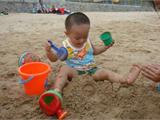Antonym mini-game develops babies' linguistic intelligence
Opposite Word Mini-game Develops Babies' Linguistic Intelligence
Baby opposite word mini-games can effectively cultivate children's basic communication abilities of association and expression, helping them develop linguistic intelligence.
Suitable Age: Over 3 years old
I. How to Play the Opposite Word Mini-Game
1. Parents first say a word like "high," and have the child respond with an opposite word such as "low" or "short."
2. There may not be just one opposite word. If there are more than three people playing, it might generate many different answers, and you can also play in a competitive answering format.
3. You can combine expressions of great surprise, pictures, drawings, block arrangements, gestures, and other body languages for descriptions or hints to guide the baby. You don't need to play the game in a stiff manner; combining various gaming methods can increase the fun of the game.
II. Examples of Common Opposites
Fat - Thin Long - Short Front - Back Inside - Outside Up - Down Big - Small Thick - Thin Light - Heavy Left hand - Right hand Cold - Hot High - Low Short Fast - Slow Wide - Narrow Loose - Tight Good person - Bad person Buy - Sell Curved - Straight Horizontal - Vertical New - Old Bitter - Sweet Enter - Exit Push - Pull Sparse - Dense East - West Deep - Shallow Awake - Sleep Old - Young Active - Passive Strong - Weak Open - Close True - False White - Black Cry - Laugh Hungry - Full Good - Bad Beautiful - Ugly Come - Go Biased - Straight Raise - Lower Mountain - Plain Agree - Disagree
III. Small Tips
1. The game can be integrated into daily life. For example, during meals, compare the chopsticks between mom and the baby, one is long and one is short. Tell the baby: Mom's chopsticks are long, the baby's chopsticks are short. When playing in the park, compare whose shadow is longer or shorter. These are all good methods. While playing on a seesaw with friends, dad or mom can say while following the baby’s ups and downs: “The baby is high, the friend is low. The baby goes up, the friend goes down.” Through this, the baby will naturally compare things when recognizing objects later, identifying their differences from others or similar ones. Then discover the concept of opposites.
2. If you find that he isn't going in the direction you anticipated, don’t get discouraged. Try changing your perspective, make some compromises, adjust the direction, and follow his wishes and thoughts.
3. Remember, you're playing games with a child. Don't use an authoritative attitude or set progress schedules, otherwise, the child might not be able to continue playing.
4. Don't define a single or standard answer for opposite words. Requirements can be appropriately relaxed, accepting similar or close answers without casually negating the child's ideas.
Association and expression are the most fundamental communication abilities for babies. Parents can use their free time to play the opposite word mini-game with the baby to help develop their linguistic intelligence.



